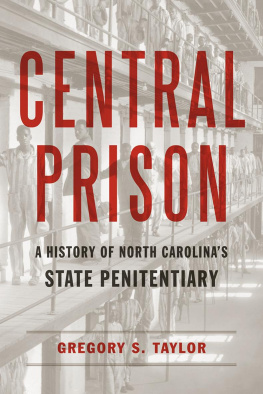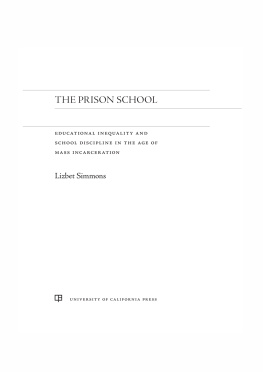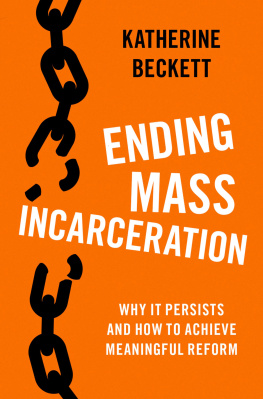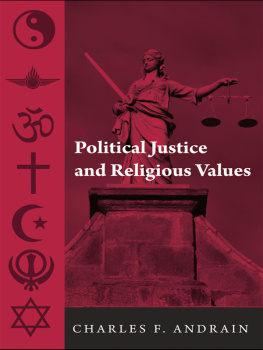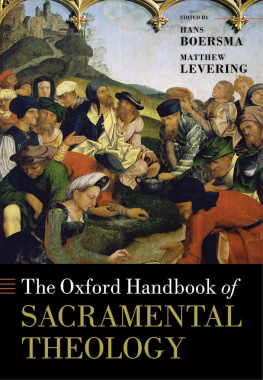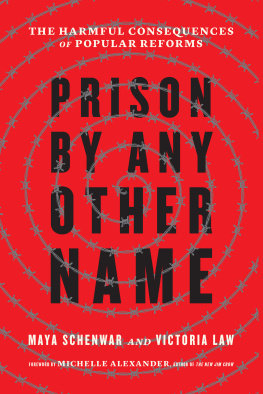Copyright 2014 Fortress Press. All rights reserved. Except for brief quotations in critical articles or reviews, no part of this book may be reproduced in any manner without prior written permission from the publisher. Visit http://www.augsburgfortress.org/copyrights/ or write to Permissions, Augsburg Fortress, Box 1209, Minneapolis, MN 55440.
Scripture quotations are from the New Revised Standard Version Bible, copyright 1989 by the Division of Christian Education of the National Council of the Churches of Christ in the USA. Used by permission. All rights reserved.
Redeeming a prison society : a liturgical and sacramental response to mass incarceration / Amy Levad.
pages cm. Includes bibliographical references.
ISBN 978-0-8006-9991-8 (pbk. : alk. paper) ISBN 978-1-4514-6512-9 (ebook)
1. ImprisonmentReligious aspectsChristianity. 2. Criminal justice, Administration ofUnited States. I. Title.
The paper used in this publication meets the minimum requirements of American National Standard for Information Sciences Permanence of Paper for Printed Library Materials, ANSI Z329.48-1984.
Manufactured in the U.S.A.
This book was produced using PressBooks.com.
This book has come about after several years of reflection and research, culminating in a couple of years of intense writing. It would not be complete without acknowledging the numerous people who contributed to it.
Colleagues have helped me deepen and hone the argument of this book. Through conversation, the occasional forwarded article or recommended book, and friendly encouragement, they helped me to carry this project forward. I am especially grateful to Cara Anthony, Jennifer Ayres, Matthew Bersagel-Braley, Claire Bischoff, Stacia Brown, Brad Burroughs, Letitia Campbell, Corrine Carvalho, Wylin Dassie, Massimo Faggioli, Michael Hollerich, Sherry Jordon, Anne King, Anne-Marie Mingo, Terry Nichols, Barb Sain, Gerald Schlabach, John Senior, Katy Shrout, Anjulet Tucker, Kelly Wilson, Paul Wojda, and Nikki Young. Several people also read early drafts of parts of the book. I appreciate the additional time and insights of Liz Bounds, Bernard Brady, Tom Bushlack, Karen Guth, Jennifer McBride, Mark McInroy, and Kathryn Getek Soltis. My research assistant, Matthew Selby, helped me put the finishing touches on the manuscript. The editorial staff at Fortress Press has been exceptionally professional, helpful, and supportive of this project. Michael Gibson, David Cottingham, Lisa Gruenisen, Kate Crouse, and Marissa Wold deserve deep gratitude for their work in improving the book. Without the guidance, care, support, and wisdom of all of these people, this book would not have come to be.
I am indebted to the University of St. Thomas in St. Paul, Minnesota for research support, including a Faculty Development Grant that gave me time and resources to jumpstart this project. Faculty Writers Retreats led by Susan Callaway provided space, time, and collegiality during the writing process. I cannot name the numerous writers who joined me in these retreats, but I nevertheless appreciate the ways they both commiserated and celebrated with me as I completed the book. Funding for a research assistant came from the Deans Office of the Saint Paul Seminary School of Divinity. I greatly appreciate the assistance that various offices and centers at St. Thomas provide for faculty research.
People in prison revealed to me much of what I came to see and know about the issues discussed in this book. For their privacy, their names will remain confidential. However, I would like to express particular gratitude to the women who participated in the Certificate in Theological Studies Program at Metro State Prison in Atlanta, GA (the program has moved to Lee Arrendale State Prison for Women). I had the honor of working with them as I helped to establish the program, which is funded by the Atlanta Theological Association through Columbia Theological Seminary, McAfee School of Theology at Mercer University, Candler School of Theology at Emory University, and the Interdenominational Theological Center. The women at Metro taught me about the possibilities of reconciliation and communion among the most excluded members of our society. I will always treasure memories of the commitment of one woman who helped me build a theological library, even though she would be released any day, but who desperately wanted to make sure that she left something good behind for the women who would remain after she left; of the care and kindness these women provided for a fellow prisoner who was severely developmentally delayed and for their only fellow prisoner on death row; of the value these women placed in being able to own a book and to discuss it with friends; of the joy and pride they found in training service dogs for people with disabilities whom they would never meet. These experiences would not have been possible without the vision and tenacity of Susan Bishop and Liz Bounds, who brought me into this project. I am also grateful to my fellow teachers, especially Marian Broida, Anika Jones, Dave Garber, Lerone Martin, and Jenny McBride.
I owe more thanks than I can fully express to my family for their love and unfailing support. Although many others deserve acknowledgement, four family members merit more attention here. My sister, Katy, inspired my interest in the topic of this book in the first place. She is a tough woman; she is also astonishingly kind and generous. She exemplifies inclusive table fellowship every day with the people she serves at Waffle Housebringing flowers to the elderly widower at one table on the anniversary of his wifes death; learning American Sign Language to take orders for scattered, smothered, and covered hash browns for hearing impaired customers at another table; on the other side of the restaurant, welcoming a regular customer with Downs Syndrome with open arms. I am grateful for the example Katy provides of how to love ones neighbors, especially those who are typically marginalized in our society. This book is dedicated to her.
My parents, Richard and Karen, created a household in which the liturgical and sacramental life were valued and celebrated. When I was a child, they regularly hosted communion services in our living room with close friends (and their guitars, of course). They fostered my interest in theology; they awoke my imagination to the beauty and complexity of Gods grace disclosed in the world. Their formation is the starting point of my recognition that the liturgy and sacraments are the roots of our hope for the world, especially in the work for justice. To them, infinite thanks.
Finally, when I started writing this book, I was pregnant with my daughter, Iris. As the book goes to press, she is two years old. Needless to say, I could not have written this book or reared this child alone, even if Iris is a pretty easy kid. I am blessed by the support of my husband, Mark DelCogliano, who carved out time from his own research and writing schedule to ensure that I could complete my work and that our daughter would always have the care of one parent or another. He is a fine intellectual, a genuine partner, and a kind father. I am glad we get to do all of this together.


